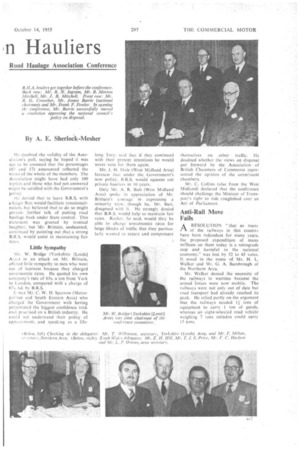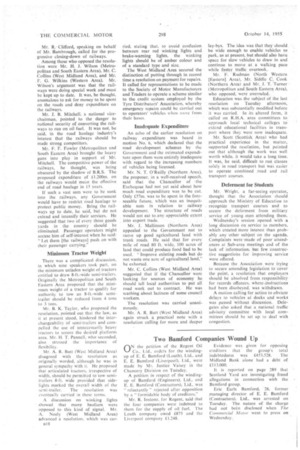in Hauliers
Page 51

Page 52

If you've noticed an error in this article please click here to report it so we can fix it.
Road Haulage Association Conference
By A. E. Sherlock-Mesher
Ha doubted the validity of the Association's poll, saying he hoped it was not to be assumed that the percentages and 17) announced reflected the vic..\ 5 of the whole of the members. The Azsociation might have had only 100 replies and those who had not answered might be satisfied with the Government's policy.
denied that to leave H.R.S. with a larger fleet would facilitate renationalization, hut believed that to do so might prevent further talk of putting road haulage hack under State control. This statement was greeted by ironical laughter, but Mr. Brittain, undaunted, continued by pointing out that a strong B.R.S. would assist in maintaining fair rates.
Utile Sympathy
Mr. W. Bridge (Yorkshire (Leeds] Area) in an attack on Mr. Brittain, offered little sympathy to men who went out of business because they charged uneconomic rates. He quoted his own company's rate of 65s. a ton from York to London, compared with a charge of 67-,. 6d. by 13.R.S.
It was Mr. C. W. H. Sparrow (Metropolitan and .South Eastern Area) who charged the Government with having perpetrated the biggest -confidence trick ever practised on a British industry. He could not understand their policy of appeasement, and speaking as a life
long Tory, said that if they continued with their present intentions he would never vote for them again.
Mr. J. H. Male (West Midland Area) foresaw that under the Government's new policy, B.R,S. would squeeze out private hauliers in 10 years.
Only Mr. A. R. Butt (West Midland Area) spoke in appreciation of Mr. Brittain's courage in expressing minority view, ,though he, Mr. Butt, disagreed with it. He strongly denied that B.R.S. would help to maintain fair rates. Rather, he said, would they be able to charge unece.rnOmic rates for large blocks of traffic that the particularly wattled to secure and compensate
themselves on other traffic, He doubted whether the views on disposal put forward by the Association of British Chambers of Commerce represented the opinion of the constituent chambers.
Mr. C. Collins (also from the West Midland) declared that the conference should challenge the Minister of Transport's right to ride roughshod over an Act of Parliament.
Anti-Rail Move Fails •
ARESOLUTION " that as many of the railways in this country have been redundant for many years, the Proposed expenditure of many millions on them today is a retrograde step and harmful to the national economy," was lost by 52 to 45 votes. It stood in the nanic of Mr. H. L. Walker and Mr. G. A. Bambrough -of
the Northern Area. "
Mr. Walker denied the necessity of the railways in wartime because the armed 'forces were now mobile. The railways were not only out of date but road transport had already reached its peak. He relied partly on the argument that the railways needed 11 tons of equipment to carry 1 ton of gnodS, whereas an eight-wheeled road vehicle weighing 7 tons unladen could carry 15 tons.
Mr. R. Clifford, speaking on behalf of Mr. Bamb rough, called for the progressive closing-down of railways.
Among those who opposed the resolution were Mr. H. J. Wilson (Metropolitan and South Eastern Area), Mr. C. Collins (West Midland Area), and Mr. . F. G. Wilkins (Western Area). Mr. Wilson's argument was that the railways were doing special work and must be kept up to date. It was, he thought, anomalous to ask for money to be spent on the roads and deny expenditure on the railways.
Mr. J. B. Mitchell, a national vicechairman, pointed to the danger to national security of converting the railways to run on oil fuel. It was not, he said. in the road haulage industry's interest that the railways should be made strong competitors.
Mr. F. F. Fowler (Metropolitan and South Eastern Area) brought the heavy guns into play in support of Mr. Mitchell. The competitive power of the railways, he thought, was being obscured by the shadow of B.R.S. The proposed expenditure of £1.200m. on the railways would mean the effective end of road haulage in 15 years.
If such a vast sum were to be sunk into the railways, any Government would have to restrict road haulage to protect public money. Bring the railways up to date, he said, but do not extend and intensify their services. He suggested that two of every three goods yards in the country should be eliminated. Passenger operators might accuse him of self-interest when he said: "Let them [the 'railways] push on with their passenger carrying."
Minimum Tractor Weight
There was a complicated discussion, in which nine speakers took part, on the minimum unladen weight of tractors entitled to draw 8-ft.-wide semi-trailers. Originally the Metropolitan and South Eastern Area proposed that the minimum weight of a tractor to qualify for authority to tow an 8-ft-wide semitrailer should be reduced from 4 tons to 3 tons.
Mr. B. K. Taylor, who proposed the resolution, pointed out that the law, as it at present stood, hindered the interchangeability 'of semi-trailers and compelled the use of unnecessarily heavy tractors to secure the desired platform area, Mr. H. T. Pannell. who seconded, also stressed the importance of flexibility.
Mr. A. R. Butt (West Midland Area) disagreed with the resolution as originally worded, although he was in general sympathy with it. He proposed that articulated tractors, irrespective of width, should be permitted to tow semitrailers 8-ft. wide provided that sidelights marked the overall width of the semi-trailer. The resolution was eventually carried in these terms.
A discussion on winking lights showed that many hauliers were opposed to this kind of signal. Mr. A. Neely (West Midland Area) advanced a resolution, which was car 818 red, stating that, to avoid confusion between rear red winking lights and brake-warning lights, the winking lights should be of amber colour and of a standard type and size.
The West Midland Area secured the distinction of putting through in record time a resolution on payment for repairs. It called for representations to be made to the Society of Motor Manufacturers and Traders to operate a scheme similar to the credit system employed by the Tyre Distributors' Association, whereby emergency repairs could be carried out to operators' vehicles when away from their bases.
Inadequate Expenditure
An echo of the earlier resolution on railway expenditure was heard in motion No. 6, which declared that the road development schemes by the Government and the estimated expenditure upon them were entirely inadequate with regard to the increasing numbers of vehicles being licensed.
Mr. N. T. O'Reilly (Northern Area), the proposer, in a well-received speech, said that the Chancellor of the Exchequer had not yet said about how much road expenditure was to be cut. Only 1.57m. was to be spent in the foreseeable future, which was an inequitable sum in relation to railway development. The structure of roads would not eat to any appreciable extent into export trade.
Mr. I. Mallinson (Northern Area) appealed to the Government not to carve up good agricultural land with trunk roads. He said that for every mile of road 80 ft. wide. 100 acres Of land that could produce food had to he used. "Improve existing roads but do not waste one acre of agricultural land," he exhorted. • Mr. C. Collins (West Midland Area) suggested that if the Chancellor were looking for sources of economy he should tell local authorities to put all road work out to contract. He was scathing about laziness of some council workers.
The resolution was carried unanimously.
Mr. A. R. Butt (West Midland Area) again struck a practical note with a resolution calling for more and deeper lay-bys. The idea was that they should be wide enough to enable vehicles to park, as at present, but should also have space for slow vehicles to draw in and continue to move at a walking pace while faster traffic overtook, Mr. F. Rudman (North Western [Eastern] Area), Mr. Siddle C. Cook (Northern Area) and Mr. J. T. Turner (Metropolitan and South Eastern Area), who opposed,, were overruled.
Education was the subject of the last resolutioh on Tuesday afternoon, which was substantially modified before it was carried. In its altered form, it called on R.H.A. area committees to approach local technical colleges to extend educational facilities in transport where they were now inadequate.
Mr. Scott (Scottish. Area) who had practical experience in the matter, supported the resolution, but pointed out that although dile work was well worth while, it would take a long time. It was, he said, difficult to run classes solely in road transport but was easier to operate combined .road and rail transport courses.
Deferment for Students
Mr. Wright, a far-seeing operator, thought that the Association should approach the Ministry of Education to recognize transport courses and to secure the deferment from military service of young men attending them.
Wednesday's session opened With a long discussion on service to members, Which created more interest than probably any -other subject on the agenda. Complaints were made of poor attendances at Sub-area meetings and of the lack of information, but few constructive suggestions for improving service were offered.
Because the Association were trying to secure amending legislation to cover the point, a resolution that employers should be absolved from responsibility for records offences, wheresinstructions had been disobeyed. was withdrawn.
A motion calling for action to obviate delays to vehicles at docks and works was passed without discussion. Delegates also asked that a national traffic advisory committee with local committees should be set up to deal with congestion.




















































































































